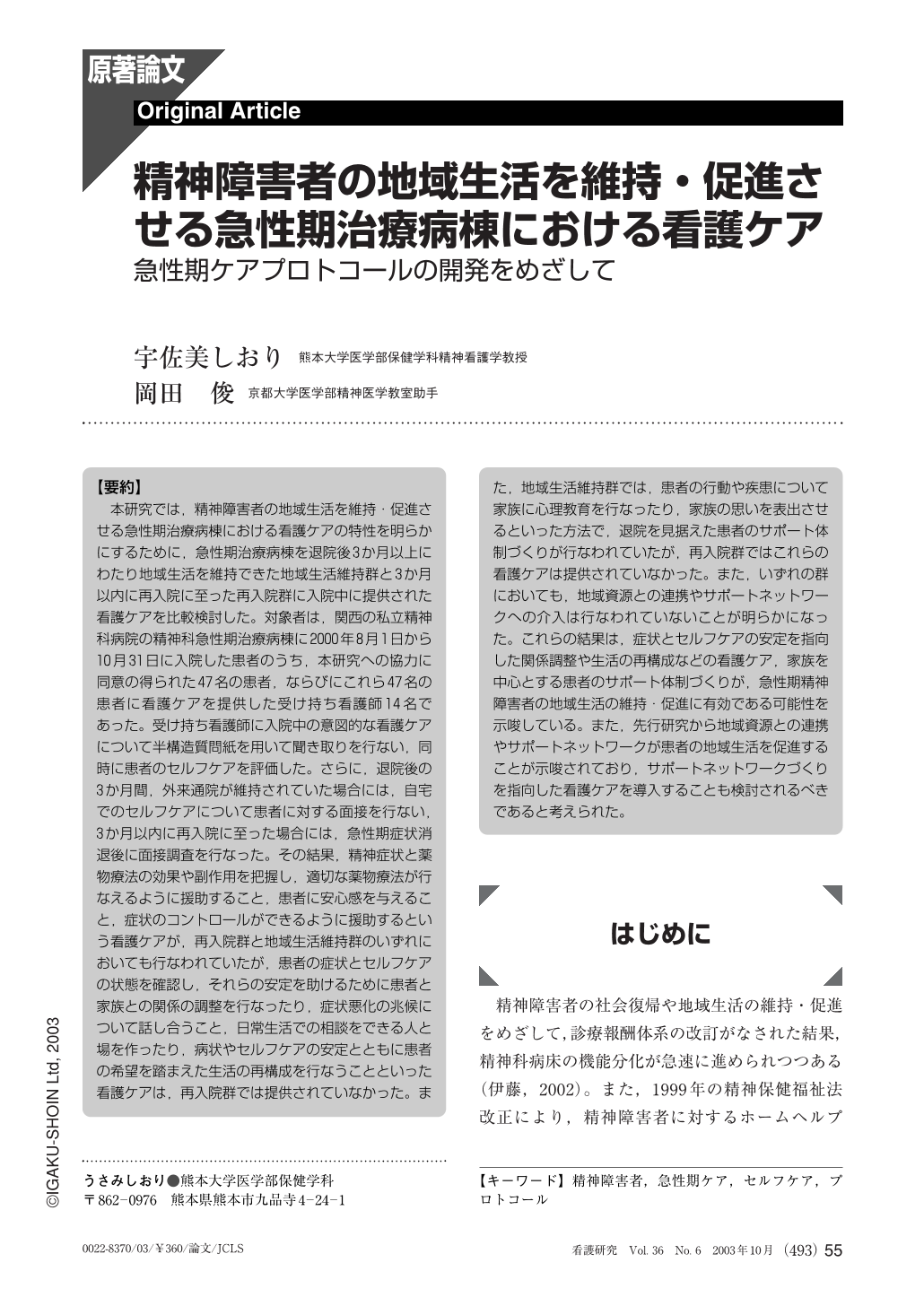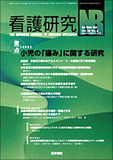Japanese
English
- 有料閲覧
- Abstract 文献概要
- 1ページ目 Look Inside
【要約】
本研究では,精神障害者の地域生活を維持・促進させる急性期治療病棟における看護ケアの特性を明らかにするために,急性期治療病棟を退院後3か月以上にわたり地域生活を維持できた地域生活維持群と3か月以内に再入院に至った再入院群に入院中に提供された看護ケアを比較検討した。対象者は,関西の私立精神科病院の精神科急性期治療病棟に2000年8月1日から10月31日に入院した患者のうち,本研究への協力に同意の得られた47名の患者,ならびにこれら47名の患者に看護ケアを提供した受け持ち看護師14名であった。受け持ち看護師に入院中の意図的な看護ケアについて半構造質問紙を用いて聞き取りを行ない,同時に患者のセルフケアを評価した。さらに,退院後の3か月間,外来通院が維持されていた場合には,自宅でのセルフケアについて患者に対する面接を行ない,3か月以内に再入院に至った場合には,急性期症状消退後に面接調査を行なった。その結果,精神症状と薬物療法の効果や副作用を把握し,適切な薬物療法が行なえるように援助すること,患者に安心感を与えること,症状のコントロールができるように援助するという看護ケアが,再入院群と地域生活維持群のいずれにおいても行なわれていたが,患者の症状とセルフケアの状態を確認し,それらの安定を助けるために患者と家族との関係の調整を行なったり,症状悪化の兆候について話し合うこと,日常生活での相談をできる人と場を作ったり,病状やセルフケアの安定とともに患者の希望を踏まえた生活の再構成を行なうことといった看護ケアは,再入院群では提供されていなかった。また,地域生活維持群では,患者の行動や疾患について家族に心理教育を行なったり,家族の思いを表出させるといった方法で,退院を見据えた患者のサポート体制づくりが行なわれていたが,再入院群ではこれらの看護ケアは提供されていなかった。また,いずれの群においても,地域資源との連携やサポートネットワークへの介入は行なわれていないことが明らかになった。これらの結果は,症状とセルフケアの安定を指向した関係調整や生活の再構成などの看護ケア,家族を中心とする患者のサポート体制づくりが,急性期精神障害者の地域生活の維持・促進に有効である可能性を示唆している。また,先行研究から地域資源との連携やサポートネットワークが患者の地域生活を促進することが示唆されており,サポートネットワークづくりを指向した看護ケアを導入することも検討されるべきであると考えられた。
The purpose of this paper is to describe the nursing care for patients with mental illness at an acute care treatment unit in a private psychiatric hospital. This paper compares the nursing care for patients readmitted within 3 months after discharge (Group A) with nursing care for patients remain in the community more than 3 months after their initial discharge (Group B). Forty-seven patients, who consented to this study and admitted to the acute care treatment unit between Aug.1 and Oct. 30 in 2000, were interviewed about their self-care at home after discharge and fourteen primary nurses, who provided nursing care for those same 47 patients, were also interviewed about intentional nursing care at an acute care treatment unit. The nurses and patients agreed to this study and they cooperated fully. The nursing care at the acute care treatment unit were ①to monitor symptoms and self care, ②to monitor effects and side effects of medication, ③to create a safe environment, ④to understand how patients control their own symptoms, ⑤to recognize the relationship between symptoms and self-care, ⑥to support other people who interact with patients at home, ⑦to find financial support, ⑧to look for people who can support patients in the community, ⑨to expand self-care to meet each patients' individual needs. In group B, nurses were able to influence every category of nursing care, but in group A, nurses were unable to provide nursing care of ⑤to⑨. Furthermore, in group A, nurses were unable to interact with patients' family and they couldn't make family support system for patients. And in both group, nursing care to make community support for patients were not categorized. Based on these results, it was found that family support and linkage with community support for patients at acute care treatment unit were very important factors to enforce patients successful community living.

Copyright © 2003, Igaku-Shoin Ltd. All rights reserved.


